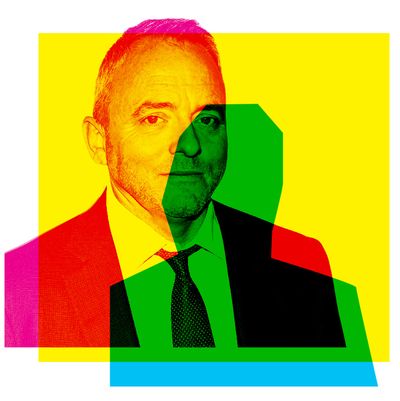
Dennis Lehane moved from Boston to Southern California ÔÇ£three years, nine months, and two days ago,ÔÇØ he says, and the specificity of his answer gives him away. He knows it; heÔÇÖs not hiding anything. But he is feeling a bit unsettled. ItÔÇÖs a brisk Friday afternoon in Santa Monica, and he has no obvious reason to be at loose ends: His 14th novel, Since We Fell, is due out any minute; heÔÇÖs working with David E. Kelley (Ally McBeal, Big Little Lies) on a ten-episode adaptation of Stephen KingÔÇÖs 2014 novel Mr. Mercedes; heÔÇÖs got a vacation to Hawaii coming up, and he has nothing pressing he needs to finish. And yet thatÔÇÖs the problem, or one of them. ÔÇ£I have a very hard time not working,ÔÇØ he concedes, in a voice that bears a trace of Boston, where he was born and where nearly all his most-celebrated books, such as Mystic River and Gone, Baby, Gone, take place. ÔÇ£You donÔÇÖt want to be around me if IÔÇÖm not working. I start to lose my identity fast.ÔÇØ
Lehane, whoÔÇÖs 51, is best known for his novels, but heÔÇÖs spent the past decade or so carving out a parallel career in film and television, starting in 2004, when he began writing for The Wire. Several of his novels have been adapted into features ÔÇö Mystic River in 2003 by Clint Eastwood, Shutter Island by Martin Scorsese in 2010 ÔÇö which is why Lehane came west in 2013, where he now pursues a bifurcated existence: a New Englander in California; an author seeking to balance the isolation of writing prose with the collaborative nature of TV. ÔÇ£IÔÇÖve been doing it so long, for 31 years, I donÔÇÖt know how to not,ÔÇØ he says of writing fiction. ÔÇ£Scripts are all about advancing the narrative. But I need to just write a nice clean line now and then.ÔÇØ
Lehane is talking about art, and heÔÇÖs talking about business, but heÔÇÖs also talking about finding a comfort zone. This is an ongoing theme in his life these days: the matter of expatriation, even exile. His school-age daughters are happy in the west. The work is plentiful and good. ÔÇ£If I go back, I give all that up.ÔÇØ As for the restlessness, it has always been a part of what drives him, and a key factor in his fiction: ÔÇ£ItÔÇÖs very hard for me to drill down on a character whoÔÇÖs not an outsider. I donÔÇÖt function well with people who fit.ÔÇØ
His work often centers on characters who are unsure of what they want or what they have, and Since We Fell features such a figure: a former investigative reporter named Rachel Childs. It moves from her childhood with a withholding mother, to her experience covering the 2010 Haiti earthquake, to her marriage to a mysterious man who has a talent for turning up where he should not. The novel sprang, he says, from a desire to ÔÇ£do a HitchcockÔÇØ ÔÇö to tell a story where the danger is related to the personality of the main character, a mystery in which the risk is psychological and physical.
Since We Fell is a departure for Lehane ÔÇö part thriller and part domestic drama, itÔÇÖs largely the saga of RachelÔÇÖs complicated marital life. Perhaps not coincidentally, Lehane finds himself at a new imprint with a new editor. The book also benefited from what he calls ÔÇ£happy accident,ÔÇØ the moment the narrative begins to assert itself. He cites the first 100 pages, which detail RachelÔÇÖs early years. They were not part of the original draft but grew from a scene in which the character confronts the memory of her mother. ÔÇ£It was a great feeling, because I felt: IÔÇÖm not writing for plot anymore. ItÔÇÖs like my first drafts are base coat.ÔÇØ Asked to elaborate, he breaks the process into two parts: plot and the interior narrative. ÔÇ£First, get why they read down. Then get why you write down.ÔÇØ
For Lehane, this is an increasingly essential balance, between crime fiction and social narrative. ÔÇ£It was only after I finished Mystic River that I realized I was writing about the vanishing of a culture. ItÔÇÖs like that great Tony Soprano line: ÔÇÿIÔÇÖm getting the feeling that I came in at the end.ÔÇÖ ThatÔÇÖs what I was writing about ÔÇö a group of people who felt they came in at the end.ÔÇØ Now he wants to cast the net more widely to write about people he hasnÔÇÖt addressed. ÔÇ£The idea of the white male working-class crime story,ÔÇØ he says, ÔÇ£I canÔÇÖt wrap my arms around it anymore.ÔÇØ
There it is again, that uneasiness, that restlessness. The Red Sox are on TV, and Lehane checks the score, then tells a story about his father, who constantly ÔÇ£talked about going back to Ireland every day from the time he landed in Boston. The immigrantÔÇÖs lament.ÔÇØ After his first flush of success, Lehane offered to buy his father a property in Ireland, only to be rebuffed. ÔÇ£Why the hell would I want that?ÔÇØ the older man said to him, as if complaining had been the point. ÔÇ£I worry,ÔÇØ Lehane says with a chuckle, ÔÇ£that IÔÇÖm that guy now.ÔÇØ
Since We Fell will be published on May 9 by Ecco.
*This article appears in the May 1, 2017, issue of New York Magazine.

